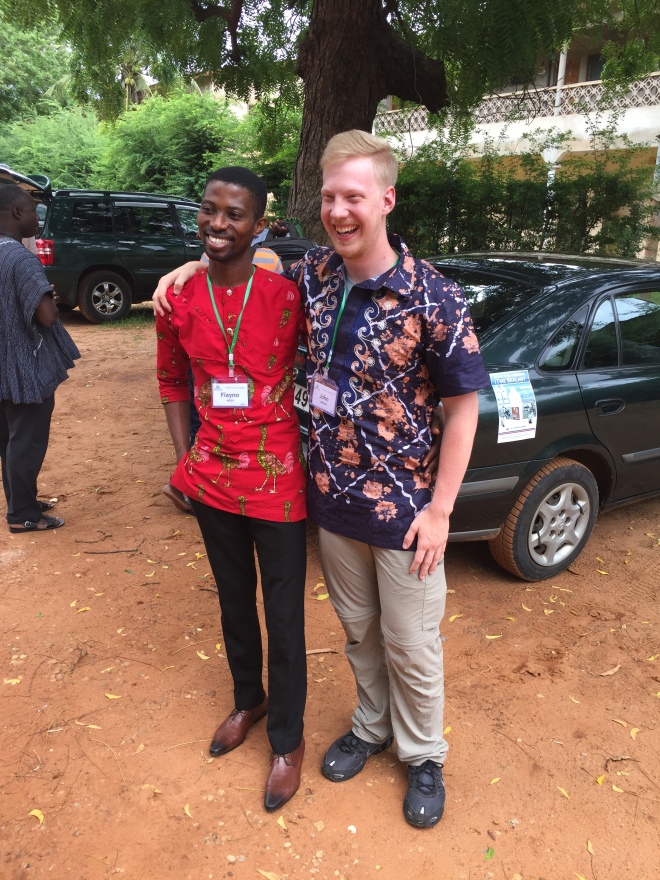
You, however, know all about my teaching, my way of life, my purpose, faith, patience, love, endurance, persecutions, sufferings—what kinds of things happened to me in Antioch, Iconium and Lystra, the persecutions I endured. 2 Timothy 3:10
This post started with a conversation on IM with my pastor friend, Benvictor Ojongmanyinkongho, from Limbe, Cameroon. Yes, that’s his real name. I refer to him as Benvictor “Alphabet”. Benvictor said “Mentoring is about catching through observation and experiencing through relationships.”
We were preparing for a mentoring conference in Nigeria. We were together in Lome, Togo last year with 30 West African leaders from 12 countries. I spoke on mentoring to millennials and brought John Mark, age 23, with me. I had been meeting with him for several months as his mentor. He is pictured above with Kwame, our translator from Togo.
Our travel to Togo was anything but ordinary. Our flight to Brussels was delayed by 2 hours, resulting in a missed flight to Togo. We were re-booked on AirMaroc and spent the next 8 hours in the Brussels airport. Our AirMaroc flight was also delayed 2 hours, causing us to miss our connecting flight to Togo in Casablanca. We didn’t realize it at the time, but the next flight to Togo wouldn’t be until 3 days later.
I won’t bore you with the details of being stranded in Casablanca. AirMaroc did a miserable job in keeping us informed; they did a better job in putting us up for free at a nice hotel, the Atlas Sky. It was labeled a “4-Star” hotel, but I think they gave themselves that rating. John Mark agrees, although, in fairness, we weren’t exactly “roughing it.”
After several trips from the Hotel to the airport trying to get rebooked, including another cancelled flight at 11 pm the next evening, we settled in to make the best of our circumstances. John Mark, at one point, mentioned that he had never had a travel experience like this before. I responded that it was new to me, too, even though I was an experienced world traveler.
I figured out that we could rent a taxi for a day for $50. Our hotel was 20 miles from Casablanca. I came up with a list of sites and places to see, and we took two taxi trips touring Casablanca. The taxis took us from place to place on my list, waiting nearby while we investigated the locale.
On day three, we arrived in Togo at 2:30 am in the morning. We navigated getting a visa from the corrupt immigration folks who didn’t want to give us any change back for paying in U.S. currency. We were owed about US$40. I finally got change in the local currency, which was fine by me.
While I did get a little upset at the airline (for the record, never, ever, fly AirMaroc if you can avoid it), we survived our 3-day unplanned diversion to Morocco. When we got to Togo, our days were packed with meetings and presentations from other leaders. There was little time to interact with John Mark due to the tight schedule of the sessions.
On our return flight, I asked John Mark what he got out of our trip. Thinking he would say something about meeting new people and making friends in Togo, he surprised me by saying his best experience was hanging out with me and exploring Casablanca together.
His comment made me realize that the real purpose of our travel odyssey was to spend valuable time together. He was able to observe me face adversity – the difficulty of dealing with an airline that cared little about customer service and was antagonistic when we tried to re-book on another airline.
Which brings me to the point of this story. Much of life is caught, not taught. I believe this is especially true for millennials who have such short attention spans. Jim Henson, creator of the Muppets, said it this way: “Kids don’t learn from what you try to teach them. They learn from who you are.” Good stuff.
I brought John Mark along with me to Togo to let him experience a very different culture and meet new friends. I never dreamed we would have an unintended stay in Morocco, but obviously, God had other plans.
In three days, we got to know each other and developed a deeper relationship. I am convinced of that it wouldn’t have happened had we made all of our flights on time.
Many of my generation considering mentoring are intimidated, for no reason, really. The anxiety comes from doing something new. Yet, developing a relationship with someone from the next generation is all that is required.
The challenge for mentors is to develop deeper relationships with your mentees. They can see you as you are, not as you might be trying to project. If they see you as authentic and real, you will have made great progress in your rapport with one another.
MENTOR TAKEAWAY: I will resist suggesting that a mentor get stuck in Casablanca for three days with his mentee, but I think a mentor should creatively figure out ways to spend time just doing life together. That could be by going to a sporting event or concert together.
WORSHIP: As a reminder that it’s often not our conversation that is important, listen to the song titled “May My Words Be Few” by Matt Redman.
COMMENT: I would be delighted at comments on this or any other post. You can comment by clicking on the icon at the top of the page or emailing me at otterpater@nc.rr.com.
SUBSCRIBE: You can receive an email notice of each post by clicking on the icon at the top right corner of the site (www.mentorlink.wordpress.com) and entering your email address.



